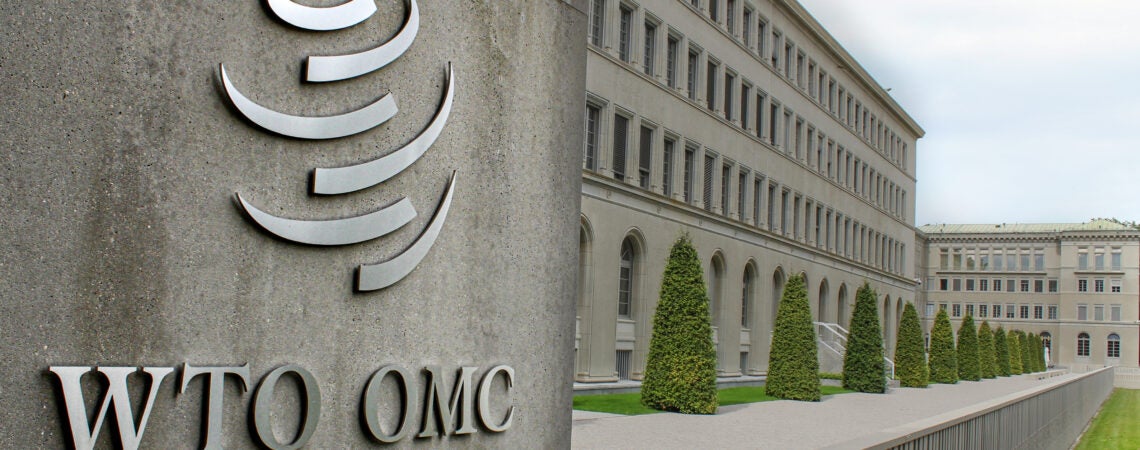Responsible global leaders now confront a troubling reality: the old notion that countries who trade together are less likely to go to war has been laid to rest on Ukrainian soil.
Vladimir Putin’s brutal invasion of Ukraine has been a seismic event for the world’s leading democracies, drawing them together in ways that only weeks ago seemed unimaginable. A stronger, more unified NATO is one example, as is the impressive solidarity among an array of countries in implementing wide-ranging sanctions and securing a vote of condemnation in the United Nations.
As the collective will grows to confront the destabilizing authoritarianism of Russia, as well as one of its strongest backers, China, what should become of the institutions that enabled their rapid integration into the post-Cold War world economy? The currently beleaguered World Trade Organization (WTO) both opened markets for Russia and China and gave them equal status in writing international trade rules. Does the WTO continue to drift towards irrelevance as Cold War rivalries reemerge and divisions between competing economic systems intensify? Or can the market-oriented democracies that created the WTO find a new unity of purpose and forge a common agenda that challenges the growth of authoritarianism and addresses China’s economic model?
Critics believe the WTO has made it too easy for authoritarian systems to derive significant benefits while contributing little in return. So far, governments have failed to deal with this dilemma, but recent events have changed this dynamic. In addition to financial and other sanctions already imposed, Russia’s WTO benefits have now come under attack. Key countries are moving to strip Russia’s most-favored-nation (MFN) tariff status, the lynchpin of WTO membership, or to block imports from Russia altogether despite their WTO rights. President Joe Biden has halted Russian oil and gas imports. Congress is agitating for a full MFN cutoff. Canada has already acted, and the United States, other G7 members, and the European Union (EU) are poised to move.
Revocation of Russia’s WTO membership would present a much more difficult path under the organization’s consensus rules, where Russia could block its own suspension. China would not support an expulsion resolution either. But the fact that expelling Russia is even under discussion reveals the depth of determination to remove Russia from global commerce.
While Russia is the immediate focus, these actions send a strong message to China that the United States and other market-oriented democracies are growing increasingly frustrated with a WTO status quo that disproportionately benefits autocratic, mercantilist economies. The Trump administration’s tariffs, however clumsy, already challenged that reality, and Biden has not withdrawn them. A careful read of the bills in Congress to repeal Russia’s MFN status suggests that similar action against China isn’t unthinkable. And the United States is not alone. In recent years, the EU has become increasingly concerned about China’s unfair trade practices and human rights record, putting its bilateral investment deal on ice and initiating a WTO dispute over China’s coercive measures against Lithuania. Other WTO members have also raised deep concerns over China’s unfair practices.
Of course, China is not Russia. As the second-largest global economy, it has strong and growing economic ties with most countries and its gravitational economic pull is on the rise. But China’s WTO relations become harder, not easier, as a result of Russia’s war, especially since Xi Jinping has maintained political alignment with Russia in spite of Putin’s behavior. As political divides grow, so too will the disaffection of the WTO’s major democracies with the idea that China should be a leading player in defining WTO rules.
It is impossible to detach trade from politics. The world has just seen how autocracy can not only create horrific human suffering, but destroy the foundations for peaceful commerce. This war will, therefore, have an inevitable and perhaps dramatic meaning for the WTO’s future. In the short term, it creates new headwinds to an already existing state of sclerosis. It is hard to imagine Americans or Europeans in the same room as Russian delegates pretending that one WTO member didn’t just invade another. But over the longer term, we now have a powerful incentive for the United States and other democracies to overcome their long-standing disagreements, as occurred recently in the U.S.-EU aircraft dispute, and put collective pressure on economies like China to play ball. Indeed, the current crisis may lead the United States and like-minded members to chart a new trade future outside of the WTO framework, not necessarily abandoning the WTO entirely, but creating a new multilateral structure with deeper commitments among countries dedicated to free-market democracy. This may be the only leverage available to change the status quo.
Responsible global leaders now confront a troubling reality: the old notion that countries who trade together are less likely to go to war has been laid to rest on Ukrainian soil. It can no longer be business as usual at the WTO.
Amb. Rufus Yerxa, former WTO Deputy Director General and Senior Advisor at McLarty Associates, advises clients on global trade matters
Wendy Cutler, Vice President and Managing Director of the Asia Society Policy Institute’s Washington, DC office and Senior Advisor at McLarty Associates, advises clients on trade matters in Asia.
To read the full commentary by the National Interest, please click here.

